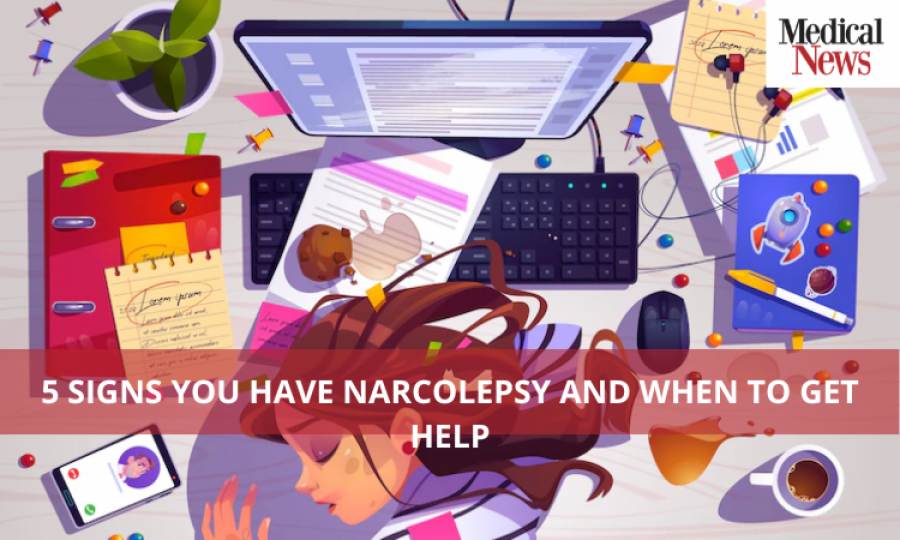5 signs you have Narcolepsy and when to get help

Narcolepsy is a long-term sleep condition characterized by excessive daytime tiredness and unexpected sleep episodes. Regardless of the situation, it may be difficult for people with narcolepsy to remain up for extended periods. The effects of narcolepsy may have a significant impact on your everyday life.
An abrupt decrease of muscular tone (cataplexy) may accompany narcolepsy in certain people, which may be brought on by an intensely emotional experience. Type 1 narcolepsy refers to narcolepsy that is accompanied by cataplexy. Type 2 narcolepsy refers to narcolepsy that does not accompany cataplexy.
What are the signs of narcolepsy?
1. Excessive day-time sleepiness
Nausea may strike at any time and any place for narcolepsy patients. When you wake up, you're energized, but you'll soon go back to sleep. You may also notice a decline in your alertness and concentration throughout the day. Inability to focus or perform at a high level is frequently the first and most troubling sign of chronic fatigue syndrome, making it difficult to deal with day-to-day tasks.
2. Cataplexy
Cataplexy is a condition that may cause slurred speech to complete muscle weakness, and it can last for a few minutes at a time. Cataplexy causes many different causes, including pleasure, excitement, anxiety, surprise, and even wrath. For example, the head droops, or the legs suddenly fall as you laugh. Some narcoleptics have cataplexy just once or twice a year, whereas others experience it many times a day. Narcolepsy patients do not all have cataplexy as a symptom.
3. Sleep paralysis
Those who suffer from narcolepsy are prone to have difficulty moving or speaking as they go off to sleep or when they awaken. Despite their short duration, these episodes may be pretty terrifying. It's possible that even if you did not influence the situation, you'd remember it without a problem.
You may experience a sort of brief paralysis known as rapid eye movement sleep (REM) while you're asleep. During REM sleep, your body may become immobile, preventing it from acting out dream activities.
4. Hallucination
You may have hallucinations while you go off to sleep, they are known as hypnagogic hallucinations; if you awaken from them, they are known as hypnopompic hallucinations. When you feel like a stranger is lurking in your bedroom, this is an example. A lack of sleep may enable you to perceive these hallucinations as if they were genuine, making them much scarier.
5. Disrupted sleep
Things like vivid nightmares, respiratory difficulties, or bodily motions may keep you awake at night.
Diagnosis
Narcolepsy is diagnosed after a thorough medical and sleeping history, physical examination, medication history, and sleep investigations are completed by your healthcare professional (performed in a sleep disorders center). Also, you may be requested to maintain a sleep journal or wear a wrist motion sensor (known as an actigraphy) for several weeks to monitor your sleep patterns and how easy it is for you to fall asleep and remain asleep.
Based on your extreme daily drowsiness and rapid decrease of muscular tone, your doctor may establish a preliminary diagnosis of narcolepsy (cataplexy). Your doctor may suggest you seek a further assessment from a sleep expert after making an initial diagnosis. A formal diagnosis needs an overnight stay at a sleep facility where experts conduct an in-depth sleep investigation.
The bottom line
None of this can be done regarding narcolepsy prevention. When hypocretin, a neurotransmitter in the brain, is depleted, a condition known as narcolepsy occurs. Sleep/wake cycles are regulated by hypocretin. The cells that create hypocretin may be attacked by an autoimmune illness, which may run in the family, a brain injury or tumor, infections, or toxic exposure, to name just a few.
Trending
Popular
Dow University’s new rabies vaccine is just a phone call away
-
IRD role lauded in advancing ...
02:53 PM, 12 Mar, 2024 -
Over one billion people worldwide ...
09:48 AM, 5 Mar, 2024 -
'Artificial tongue' introduced to ...
03:38 PM, 4 Mar, 2024 -
Health Alert: Dried fruits found to ...
11:47 AM, 2 Mar, 2024



